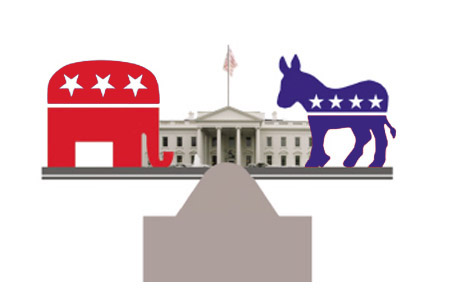(单词翻译:单击)
听力文本
So anyway, you can see obviously, a year wasn't very good for the democrats
不过很明显的是88年是民主党出师非常不利的一年
Back to when Jimmy Carter won against Ford
来看卡特在大选中战胜福特那年
it's a east-west split almost, right? with the democrats Carter another southerner taking the southeast except for Virginia very clearly
选情看起来东西两分,民主党人卡特又是一位拿下了东南部的南方人,除了弗吉尼亚例外地泛红
With Ford taking the west almost entirely
同时福特也几乎拿下了整个西部
and then the northeast, the upper great lakes split. At least at the state level, so a little bit complicated when we look at counties
还有东北部,和大湖区。至少从州级看来,情况是这样的相比之下,县级的选情会显得较为复杂
That wasn't that long. I guess I'm old enough it doesn't seem that long ago to me but we see a very different geography
这场选举其实也就是30年前的事。至少对我这个年龄的人来说它仍记忆犹新,但如今选情的分布却已十分不同

And I have to ask if anybody knows why you have a vote for Ronald Reagan coming from Washington? ever heard faithless elector?
我想问,有没有人知道为什么里根在华盛顿州获得了一票?你们有没听说过存在不忠诚选举人?
About half of the states have laws that the electors have to vote the way the states vote but the other half don't
大约过半的州都有立法规定选举人必须遵循他们州的意愿投票,但也有近半的州没有这种规定
Electors can vote for whoever they want basically and so we had a elector from Washington who real like Ronald Reagan and voted for him regardless
选举人可以投给任一他们心仪的候选人,这种情况下,华盛顿州出现了一位非常青睐里根的选举人,不顾州的意愿,把票投给了他
If you interested in you can go to Wikipedia see the sates that require them to vote as the state does but not all of them by any means
如果你有兴趣,可以上维基百科搜搜哪些州要求选举人按州的意愿投票,并不是所有州都有这个规定
Finally, my last historical map
来看最后一个年份的地图
Because I'll be showing this map as we go of course 1896 William Mckinley vs William Jennings Bryan
这幅地图是肯定要讲的1896年麦金利和布莱恩间的角逐
The pattern is pretty much the opposite of what we have today with a few exceptions
当时的格局与如今近乎相反除了一些例外
with Washington having been voting for the Democratic party then and now
例如华盛顿州,从那时至今都一直坚定不移支持民主党
Kentucky voting for their Republican party then and now and Indiana then and now, North Dakota perhaps
肯塔基州对共和党也一样忠诚,还有印第安纳州和北达科他州
but otherwise it's pretty much the inverse
其他州当时的情况则与现在全然相反
Again, the question is have the areas changed have the parties changed or is the bit of both
还是那个问题,是这些地区的人变了,还是政党本身变了?抑或两者皆而有之?
While in this election William Jennings Bryan was in favor of the common people, The poor people particularly farmers and miners
在这场选举中,布莱恩受到了普通百姓的支持,如穷人,尤其是农民以及矿工
He ran on a platform of inflation. He wanted coinage in silver. His big issue was the gold standard
他将抑制通货膨胀写入竞选纲领。他希望银币能自由铸造,他最主要的主张就是放弃金本位制
He claimed that the American workers and farmers were being crusified on a cross of gold. They were deeply in debt
他认为美国的工人和农民会被钉在黄金的十字架上,他们负债累累
There was a shortage of gold which meant a deflationary environment and farmers who were deeply in debt couldn't make their payments
因为黄金的不足意味着物价紧缩,负债沉重的农民无法维持生计
So it's really the election is all about monetary policy which is interesting considering Some of the issues we're facing today
这场大选其实是一场货币政策的较量,考虑到今天我们所面临的问题,这是很有意思的
Mckinley was the candidate of gold standard of hard money, fiscal conservatism. So, then yeah that seems right
麦金利支持金本位制、黄金与货币挂钩以及紧缩的财政政策他的政策看起来似乎更合理
Republicans more business-oriented, Democrats on the opposite side
共和党人迎合了企业的利益而民主党人则更注重民生
When you look at the religious issue, it's the opposite
而在宗教问题上,他们的立场又反了过来
视频及简介
本课程结合大量地图,探索了美国总统大选(包括过去和现在)中的地理学,并且对仅仅简单把美国分为红州(共和党)和蓝州(民主党)这一说法提出挑战。现实中,美国社会两党的情况,远比这种简单的两分法要复杂。


